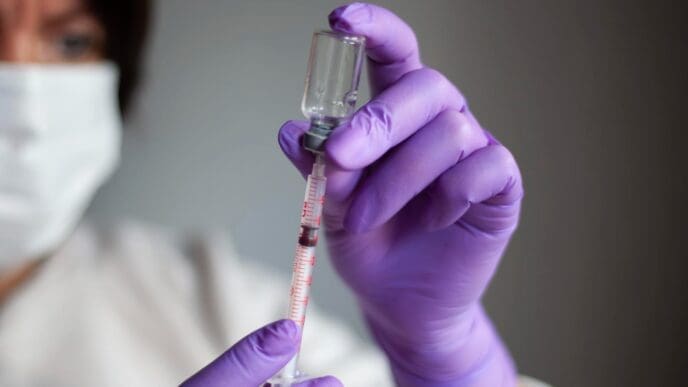For millions of people worldwide, the day doesn’t truly begin until after their first cup of coffee, tea, or energy drink. This daily ritual, centered on the world’s most popular psychoactive substance, is often praised for its ability to sharpen focus and banish fatigue. However, the complex relationship between caffeine and our mental health is a double-edged sword; what helps one person feel alert and productive may push another toward anxiety and sleepless nights. The key to understanding whether caffeine is helping or hurting your mental well-being lies in its powerful effects on the brain’s chemistry, the timing and quantity of consumption, and, most importantly, your own unique biological sensitivity.
The Science of Caffeine: How It Affects Your Brain
To understand caffeine’s impact on mood and mind, we must first look at how it works inside the brain. Its primary mechanism of action is surprisingly simple: it’s a master of disguise. Caffeine’s molecular structure is very similar to a naturally occurring compound in our brains called adenosine.
Adenosine’s job is to act as a braking system for the central nervous system. Throughout the day, as your brain works hard, adenosine levels gradually build up, binding to specific receptors and signaling to your body that it’s time to slow down and rest. This process is what creates the feeling of sleep pressure.
When you consume caffeine, it travels to your brain and parks itself in the adenosine receptors, effectively blocking adenosine from doing its job. With the brakes disabled, your brain’s natural stimulants, like dopamine and norepinephrine, can run more freely. This neurological trick is what produces caffeine’s signature effects: increased alertness, enhanced concentration, and a temporary feeling of wakefulness.
Furthermore, this stimulation of the nervous system triggers the adrenal glands to release adrenaline and cortisol, the body’s primary “fight-or-flight” hormones. While a small, short-term boost can feel invigorating, chronic elevation of these stress hormones can have significant downstream effects on both mental and physical health.
The “Help”: Potential Mental Health Benefits of Caffeine
When used moderately and mindfully, caffeine can offer several tangible benefits for mental well-being. For many, it’s a reliable tool for navigating the cognitive demands of modern life.
Enhanced Mood and Focus
The increase in dopamine activity prompted by caffeine is a key reason for its mood-lifting effects. Dopamine is a neurotransmitter closely associated with the brain’s pleasure and reward centers. A temporary surge can lead to feelings of well-being and motivation.
This biochemical boost can translate into improved performance on tasks requiring sustained attention. Whether it’s preparing for an important presentation or tackling a complex project, a moderate dose of caffeine can help sharpen focus and reduce the perception of effort, making challenging tasks feel more manageable.
Some large-scale observational studies have even suggested a correlation between regular, moderate caffeine intake and a lower risk of developing depression. Researchers theorize that caffeine’s mild anti-inflammatory properties and its positive influence on mood-regulating neurotransmitters may contribute to this protective effect, though more research is needed to establish a direct causal link.
Improved Cognitive Function
Beyond mood, caffeine is well-documented to enhance various aspects of cognitive function. It can improve reaction time, vigilance, and logical reasoning, particularly in individuals who are feeling fatigued.
It also appears to play a role in memory consolidation. Some research indicates that consuming caffeine after a learning session can help strengthen the long-term retention of that information. This makes it a popular study aid for students and a valuable tool for anyone engaged in lifelong learning.
The “Hurt”: When Caffeine Becomes a Problem
Despite its benefits, the line between a helpful tool and a harmful crutch can be thin. For many individuals, especially those with a predisposition to certain mental health conditions, caffeine can do more harm than good.
Anxiety and Jitters
The same “fight-or-flight” response that makes you feel alert can easily tip over into anxiety. The physiological effects of caffeine—a racing heart, restlessness, and trembling hands—are nearly identical to the physical symptoms of an anxiety attack. For someone already struggling with an anxiety disorder, caffeine can pour gasoline on the fire, amplifying their symptoms and making them feel out of control.
High doses of caffeine can induce a state known as “caffeinism,” characterized by nervousness, agitation, irritability, and rambling thoughts. In sensitive individuals, even moderate amounts can be enough to trigger a full-blown panic attack, creating a powerful and negative association with the substance.
Disrupted Sleep Architecture
Perhaps the most significant and often-underestimated downside of caffeine is its devastating impact on sleep. Caffeine has a long half-life, meaning it takes many hours for your body to eliminate it. A cup of coffee consumed at 3 p.m. can still have a significant stimulating effect when you’re trying to fall asleep at 11 p.m.
Even if you manage to fall asleep, caffeine can disrupt your natural sleep architecture. It is known to reduce the amount of deep, slow-wave sleep you get. This is the most restorative stage of sleep, crucial for physical repair, memory consolidation, and emotional processing. Waking up after a night of caffeine-disrupted sleep can leave you feeling unrefreshed, irritable, and emotionally volatile, even if you technically slept for seven or eight hours.
This often creates a vicious cycle. You wake up tired because caffeine ruined your sleep, so you consume more caffeine to get through the day, which in turn leads to another night of poor-quality sleep.
Caffeine Withdrawal
Regular caffeine consumption leads to physical dependence. Your brain adapts to the constant presence of caffeine by creating more adenosine receptors to try and restore balance. When you suddenly stop consuming it, the now-abundant adenosine can flood these receptors, leading to a host of unpleasant withdrawal symptoms.
These symptoms commonly include pounding headaches, profound fatigue, difficulty concentrating (or “brain fog”), and significant irritability. These feelings can easily be mistaken for or worsen the symptoms of depression or anxiety, making it difficult to discern the true source of one’s distress.
Finding Your Balance: A Guide to Mindful Consumption
The question is not whether caffeine is “good” or “bad,” but rather what is the right relationship with it for you. Cultivating a mindful approach is essential to harnessing its benefits while avoiding its pitfalls.
Know Your Limits
The U.S. Food and Drug Administration (FDA) suggests that up to 400 milligrams of caffeine per day—roughly the amount in four cups of brewed coffee—is generally safe for most healthy adults. However, this is a broad guideline. Individual sensitivity varies dramatically, largely due to genetics that influence how quickly your liver metabolizes caffeine.
Pay attention to how you feel. If one cup of coffee leaves you feeling jittery and anxious, then that is your limit, regardless of official guidelines. Be aware of hidden sources of caffeine in soda, chocolate, pain relievers, and even some “decaf” beverages.
Timing is Everything
To protect your sleep, a critical pillar of mental health, establish a firm caffeine curfew. A good rule of thumb is to avoid all caffeine for at least eight hours before your intended bedtime. For highly sensitive individuals, this window may need to be even longer.
Consider delaying your first cup in the morning. Your body’s natural cortisol levels are highest in the first hour after waking. Waiting 60 to 90 minutes to have your coffee allows you to ride this natural wave of alertness first, potentially reducing your overall need for caffeine throughout the day.
Listen to Your Body
The most important tool you have is self-awareness. Start tracking your caffeine intake and noticing how it correlates with your mood, energy levels, anxiety, and sleep quality. You might discover that your mid-afternoon slump is actually a caffeine crash, or that your heightened anxiety corresponds with days you had an extra espresso shot.
If you suspect caffeine is negatively impacting you, consider a gradual taper. Abruptly quitting can lead to severe withdrawal that makes it difficult to function. Instead, reduce your intake slowly over one to two weeks, for example, by mixing regular coffee with decaf or switching one of your coffees to herbal tea.
Ultimately, caffeine is a powerful substance that demands respect. It can be a helpful ally in boosting cognitive performance and mood, or a significant contributor to a cycle of anxiety and poor sleep. By understanding its mechanisms and honestly assessing its effects on your own mind and body, you can make an informed choice that truly supports your overall mental health. This act of mindful consumption is a potent form of self-care in a world that often pushes us to simply power through.












